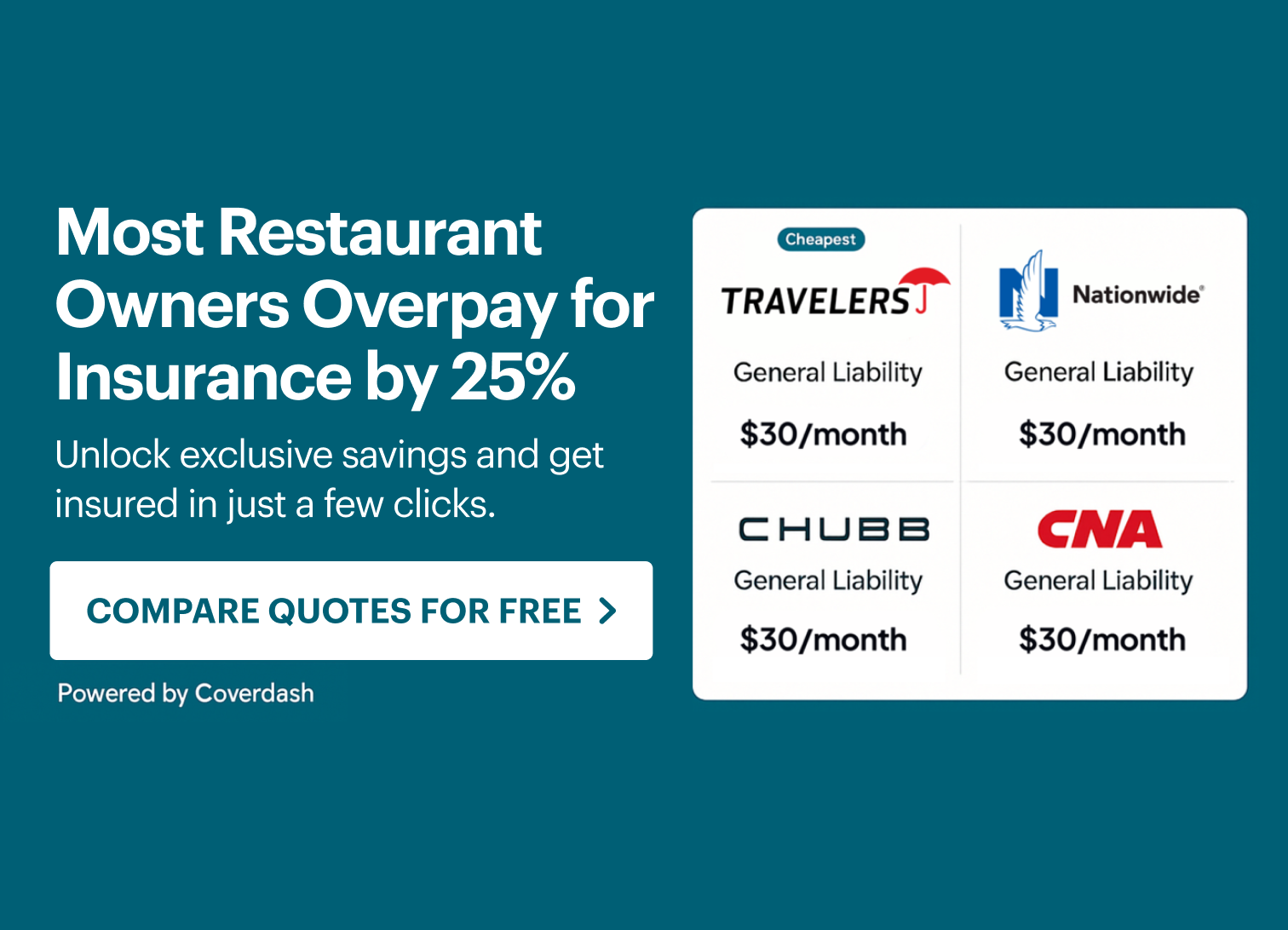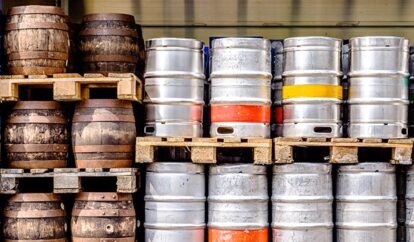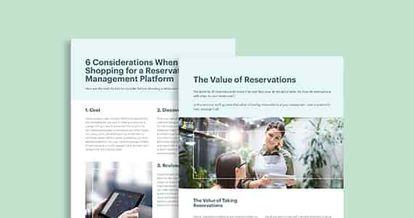If you’re a first-time restaurant owner, making connections with suppliers may seem like a daunting task. Where do you start if you don’t have a network of suppliers in your back pocket? You know you’ll need suppliers for food and beverages, but you want to make sure you’re getting the best price for the best ingredients.
In this section we’ll outline the types of food suppliers for restaurants you’ll need depending on your concept, and we’ll explain the ins and outs of the supply chain and delivery. We’ll also guide you through the process of establishing relationships with suppliers in ways that will keep costs down. Finally, we’ll provide a list of suppliers you can reach out to for each of the types we’ve identified.

Types of Food Suppliers for Restaurants
Before you read this section, keep in mind that one supply chain model may overlap with another.
As restaurant supply chain technology and operations continue to evolve, models consistently borrow practices from each other.
So you may get a local farm large enough to employ some of the infrastructure of a national wholesaler, a local market may facilitate delivery between farmers and restaurants, etc.
Here’s what you need to know about each restaurant supply chain model and how they work as individual systems.
National wholesale food suppliers
Your one-stop shop for meat, produce, dry goods, dairy, desserts – you name it. National wholesalers work with a large network of farmers to source a wide variety of ingredients for restaurants. They deliver goods via truck, and you can usually order online, over the phone, or sometimes through an app.
Fact: national wholesale food suppliers also often carry kitchen smallwares and other equipment.
Pros
- Large selection
- Centralized source for multiple goods
- More discounts and bulk deals
Cons
- Impersonal: less likely to build a relationship
- More generic, less specialized
- Ingredients are typically not as fresh
Farmers
Farm-to-table restaurants order ingredients from a farm or farming cooperative. Working with local farmers can come in the form of a direct relationship or through larger farms that have similar distribution networks as national wholesalers.
fact: locally sourced ingredients sometimes need to travel farther than you think. if you’re committed to a small carbon footprint, make sure to locate the farm on google maps to find out how far your food needs to travel.
Pros
- Fresher ingredients
- Relationship building – which may lead to discounts
- Conducive to seasonal menu building
Cons
- Higher prices
- Limited to local ingredients
- May need to order from multiple sources
Local food markets
While originally intended to bring local food from farms to communities, more chefs are shopping at local food markets for locally sourced ingredients. Farmers who sell at markets have begun to set aside some of their best crops for restaurateurs due to their growing presence at markets. Shopping at a local market allows restaurateurs to handpick ingredients and talk to the farmers who grow their food.
Pros
- Fresher ingredients
- Relationship building – which may lead to discounts
- Opportunity to learn about food
Cons
- Higher prices
- Limited to local ingredients
- Time added for shopping and pickup
fact: some local markets facilitate delivery between restaurants and farmers. check in with your local farmers’ market to find out if this is an option in your area.
Organic suppliers
Organic suppliers can come in many varieties, from large national wholesalers to local farms. Organic farming uses fewer chemicals in their fertilizers, which are known to pollute local waterways. Organic livestock is free of antibiotics, and animals are usually kept in environments that better mimic a natural habitat.
Fact: Under the USDA’s National Organic Program (NOP) regulations, organic farmers can even use pesticides that contain synthetic substances if other ways to control pests and diseases have failed. Find out here which synthetic substances are allowed for use in organic crop production.
Pros
- Environmentally friendly
- Fresh ingredients (if locally sourced)
- Marketable to diners
Cons
- Higher prices
- Seasonal limitations
- Produce may have a shorter shelf life
Butchers
Similar to working with farmers and shopping at local markets, you can rely on your local butcher to source fresh cuts of meat and educate you on where the meat came from. Butchers work with livestock farmers they’ve built relationships with, and they’re a trusted source of information about which cuts you need for your menu or for special events. Butchers can work with you to craft your menu with high-quality cuts of meat.
Pros
- Fresh cuts of meat
- Relationship building – which may lead to discounts
- Opportunity to learn about food
Cons
- Higher prices
- Limited to daily stock
- Time added for shopping and pickup
Beer suppliers
Beer suppliers come in many sizes, from national brands to local craft breweries. The beer you purchase will depend largely on your restaurant concept. If you’re a place that’s going to be known for your craft beer selection, you’ll need to work with multiple breweries to offer variety to your customers. If you’re a family establishment that just needs two or three options on the menu, you’ll probably want to work with larger national brands that offer cheaper prices.
Be aware
- Beer suppliers offer free stuff! Table tents, pint glasses, umbrellas, coasters, and menu boards – they’ll be branded with any large beer supplier’s logo, but you won’t have to pay a dime for them.
- Be aware of your state’s gallonage tax, which is imposed on wholesalers of alcoholic beverages.
Wine suppliers
If your restaurant is going big on wine, hire a sommelier who already has connections with wine suppliers. You’ll also want a sommelier to help you with wine pairings, as the type of wine they’ll order will largely depend on your menu. Wine suppliers will have a portfolio you can browse, no matter how many wines you need; there’s a lot to know about wine, so your supplier should be willing to talk you through flavor profiles and regions.
Be aware: The supplier you work with will depend on whether you want to feature local wines or wines from a region outside your own.
did you know? wine on tap is becoming more popular. new technologies are enabling restaurants to serve wine on tap to help reduce costs and improve quality.
Getting Food Suppliers for Restaurants
Before we describe the best way to ask for quotes and source suppliers for your restaurant, you need an understanding of how the food supply chain works. Here’s how ingredients are delivered from the source to your restaurant.
Farmers
Farmers, fishers, and ranchers grow crops and raise livestock.
First-line handlers
Prepare raw ingredients for processing and manufacturing. By-products from this section of the chain are fed to livestock.
Processors and manufacturers
Meat packers, bakeries, and consumer product goods companies turn processed raw materials into packaged goods.
Wholesale food suppliers
These are the companies restaurants buy from. They store ingredients in warehouses and then sell and distribute them with an extensive transportation infrastructure.
Restaurants
Supply chain technology
The restaurant supply chain is complex. Supply chain software increases shipment tracking visibility, improves communication between businesses, and enables the prediction of fluctuations in the supply chain. You may find supply chain software useful if you’re working with multiple vendors, specialty vendors, or sourcing ingredients that are rare and high in price. Read reviews of supply chain software here.
What You Need to Know Before Connecting with Food Suppliers for Restaurants
The decisions you make about your suppliers are tied to two things: your business plan and your labor costs.
When you’re thinking about getting quotes from suppliers, go back to your business plan. What does your restaurant concept require from suppliers? Here are some example scenarios:
Scenario #1
Your restaurant is a steakhouse and you want to be known for your higher quality steaks. You’ll want to spend more time sourcing quotes from butchers than you would for organic produce.
You’ll also want to tackle this from a holistic point of view. For instance, while you might be focused on your steak because that’s the heart of your concept, customers who go to a steakhouse also expect higher quality wine or a larger selection of wine. So you’ll also need to consider this when you’re seeking suppliers.
Scenario #2
You’ve opened your farm-to-table restaurant with the goal to educate your customers about where their food comes from. It will be more important for you to build relationships with local farmers than spending a lot of time on choosing specialty liquor for your bar.
Scenario #3
Your fast casual restaurant is looking to fill a gap in your neighborhood: a truly vegan quick service restaurant that specializes in takeaway high-protein salads. Your produce will need to be top-notch but still low cost enough for the quick service market.
All these scenarios serve to illustrate one thing: remain focused on your primary goal for your business. Your suppliers are your partners in business, and they are there to help you execute on your business plan. While it may be tempting to spend time getting quotes and building relationships with all kinds of suppliers, it’s more efficient to prioritize based on what your restaurant will be known for.
Quotes from alcohol suppliers are also tied to your business plan. If you want to be known for your craft beer, for instance, you’ll need to seek multiple quotes and develop long standing relationships with several breweries. The same goes for cocktails. If you’re not super focused on premium alcohol, then one liquor distributor may be a good choice to cover a broad range of beverages.
Remember to leverage your bar manager or lead bartender. They’ll have the established relationships required to make the process go much more smoothly. If you’re a place that prides itself on its beverages, seeking quotes for alcohol can be a feat unto itself – you’ll need to get three to five quotes for each premium item that requires a separate vendor. So don’t do this alone if you can help it.
The second factor you need to consider is cost of labor. Going back to Scenario #1, the steakhouse, you should be asking yourself whether you’ll be sourcing primal cuts of protein for your chef to process or having the vendor portion out retail cuts. Which is cheaper when you consider the labor costs of having your chef prepare the cuts for you? And if you choose the higher cost option, you’ll need to make up the cost elsewhere with a menu item that’s not your staple. You may want to take a lower quote from a vendor to supply portioned poultry and make sure your markup is high enough to compensate for the beef and extra prep time.
Finally, think about who will be taking deliveries and managing your suppliers. Will you have so many suppliers that you need to hire someone full time to manage their deliveries and keep an eye on the supply chain? Make sure you tailor the amount of suppliers you work with to the labor capacity your restaurant can handle.
Connecting with Food Suppliers For Restaurants
When you’re just starting your restaurant, you want to keep it simple. Here’s the best way to start making connections with suppliers:
- Start with one supplier.
Your goal is to have a small amount of suppliers. Avoid complicating your operations if your concept allows you to work with only one supplier for each of your essentials.
- Get three to five quotes for each service.
Three to five quotes for each service will allow you to compare prices but prevent you from sinking too much time into finding quotes.
- Start small to big: get quotes from small businesses before larger ones.
Larger businesses are in a better position to negotiate prices, so you’ll want to use quotes from smaller businesses as leverage for better deals.
- Take no more than a month to settle on a vendor
Quote gathering, negotiation, and contract signing need to happen quickly so that you can move forward with every aspect of your business.
- Start nurturing relationships.
Especially if you’ve decided to work with smaller vendors, you’ll want to start nurturing those relationships early. Attend farmers’ markets when you know your vendors will be there, and chat with them about their ingredients. When they see you’re passionate about what you do, they may be more willing to give you discounts and bulk promos down the line – and recommend your restaurant to their customers.
Bargaining with Suppliers
The #1 rule of bargaining? Never, ever sign with the first vendor who gives you a quote until you’ve received a sufficient number of other quotes.
Don’t be afraid to barter with your supplier if you see other suppliers with cheaper products. You won’t want to send vendors quotes from other vendors, but don’t be afraid to give them ballpark numbers when you’re letting them know how much you’ve been quoted. They may want to know if their prices are being undercut by another business, so don’t feel intimidated about notifying them.
National and Local Food Suppliers for Restaurants
National wholesalers
Canada
Colabor is a leading distributor of food and related products. Colabor distributes 50,000 products to 25,000 institutions and businesses in Quebec, Ontario, and Atlantic Canada.
Flanagan Foodservice is the largest Canadian-owned independent foodservice distributor in the country. Family owned and dedicated to customer service, the company serves more than 6,000 restaurants and foodservice operations across Ontario.
Gordon Food Service distributes to foodservice operators from Vancouver to the Atlantic to the Territories.
J & D Food Services is a leading distributor of Asian food products, frozen seafood, fresh meats, produce and canned goods in Alberta. For over 23 years, food and restaurant customers have trusted J&D to deliver the freshest, highest quality ingredients.
Canadian owned and operated, Stewart Foodservice Inc. is a highly respected distribution facility that supplies restaurants, industrial cafeterias, and government institutions across Ontario with dry-grocery, frozen, and refrigerated foods.
Sysco is the global leader in selling, marketing and distributing food products to restaurants, healthcare, educational and other facilities. Its family of products also includes equipment and supplies for the foodservice and hospitality industries.
U.S.
Sysco is the largest foodservice distribution network in the world.
Delivers more than 125,000 food and food-related products to 85,000 customer locations from their 24 broadline and 10 specialty distribution locations.
Farmers
New York City
Long Island, NY
Satur Farms, owned by chef Eberhard Müller and his wife Paulette Satur, began when they purchased their original farm on the North Fork of Long Island in 1997.
Chicago
Fairbury, IL
A small, diversified farm raising hogs, cattle, sheep, goats, chickens, ducks, rabbits, corn, soybeans, hay, and pumpkins.
Riverside, IL
Partnered with several other farmers in Wisconsin, Illinois and Michigan to bring businesses a large variety of fruits and veggies.
Toronto
Toronto, ON
Providing Toronto with local, farm-fresh meats, raised without hormones or drugs, from Ontario Amish and Mennonite farmers.
Bradford, ON
Dominion Farms grows, packs and ships carrots, onions, beets and parsnips from Canada and the USA and is proud to be the longest running distributor in Ontario.
Local food markets
New York City
Here you’ll find yourself shopping elbow to elbow with top chefs for all manner of regionally grown culinary pleasures.
Shop a huge array of fresh produce at this greenmarket in Brooklyn’s Grand Army Plaza every Saturday.
Chicago
The Maxwell Street Market runs year-round from 7am-3pm on Sundays.
The Lincoln Park Farmers market runs 7am–1pm on Saturdays from June 3–October 28.
Toronto
Stop Farmers’ Market at Wychwood Barns
On Christie just south of St. Clair West, this market attracts up to 1,500 visitors thanks to the assortment of farmers and vendors on site.
Provides local, sustainably produced fresh foods in The Junction.
With 120 vendors, St. Lawrence Market has been around for 208 years. The Market is a place where the authenticity of truly great food and shopkeepers who care reign above all else.
Butchers
New York City
Open since 1960 and in the heart of Cobble Hill, Brooklyn, Los Paisanos is fully stocked with beef, poultry, sausage, exotic meats and a complete deli section.
Located at 285 Bleecker Street in Greenwich Village, Ottomanelli & Sons has an international meat and wild game selection ranging from elk, buffalo, venison, and kangaroo.
Chicago
In an effort to support farmers as sustainably as possible, Butcher & Larder purchases their animals whole. The cuts available are off the individual animals but aren’t necessarily available every day.
Evoking old-world charm, Publican Quality Meats is a butcher shop, neighborhood café, bakery and gourmet market, aptly located in Chicago’s meatpacking district.
Toronto
Offers artisanal deli and charcuterie products, locally-sourced groceries and unique dairy items.
Ken and Donna MacDonald opened The Friendly Butcher in 1996 with a mission to support local farmers and bring great tasting locally raised products to the Yonge Lawrence Village.
Organic suppliers
New York City
Ace Natural is an organic food distribution business located in New York City. Ace has a rich 20-year history providing superb service to the most discerning NYC restaurants, caterers, food retailers and distributors.
See this directory to search the Northeast Organic Farming Association of New York database.
Chicago
Windy City Organics is a family owned and operated organic food manufacturer and distribution company founded in Northbrook, IL, a small town right outside of Chicago.
Wholesale suppliers
New York City
Since 1850 Palmer Foods has been serving customers and clients in upstate New York, distributing fresh seafood, meat, poultry and groceries to the finest dining establishments in the area.
Chicago
Distributes to Chicago area businesses such as hotels, bakeries, country clubs, restaurants, manufacturers, and retail businesses.
Wholesale meat distributor serving Chicago since 1925.
Toronto
At GFS Corporate Chef David Evans is available to help restaurants with culinary challenges, such as preparation techniques and cooking tips, to plate presentations and recipes. He can help promote the sale of high-demand/high-margin items and introduce new items that fit your concept.
Conclusion
The suppliers you work with are highly dependent on your restaurant concept and your menu. Sometimes your suppliers are even a reflection of your core values as a business owner – if you’re concerned about finding local ingredients, you’ll be making an effort to build relationships with local farmers over national suppliers. If you’re needing to source larger amounts of ingredients in bulk, then national suppliers are the way to go. Once you’ve established your go-to suppliers, consider using a restaurant order guide template to keep you and your staff organized with your inventory control.
No matter which suppliers you work with, it will always be important to remember that sourcing suppliers is primarily about relationship building. So start small, build some relationships, and you’ll probably find it’s easier to scale up after you’ve made connections and know your concept inside out.
Sign up for our free weekly TouchBistro Newsletter





